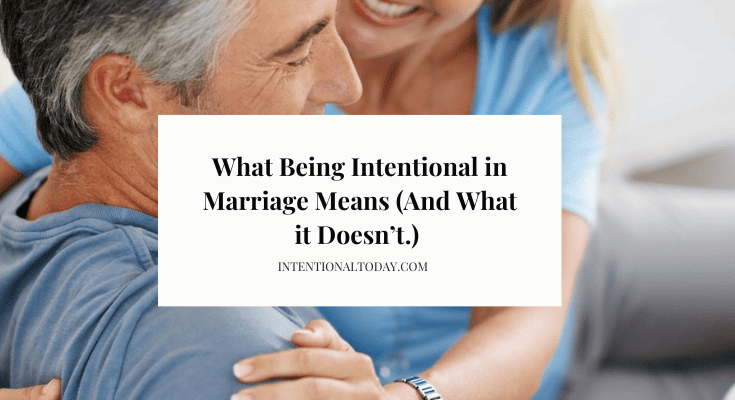What does it mean to be intentional in your marriage?
He said I was a snob. We were on our first date. Well, “two church friends chatting over tea and chips” as our missionary fundamentalist church didn’t allow dates.
The friendship didn’t last, but the idea that being straight = snobbish did. And even though I held my head high and decided that “Deliberate” would always be my middle name, the indictment wrapped around my heart like a musty cloth.

Today, I am pleased to host Ketsia Gustave to talk about intention in marriage. Ketsia is a friend, fellow blogger, coach on a mission to help women thrive in marriage without losing themselves.
I invited Ketsia to share what it means to be intentional in marriage because, all too often in conservative evangelical spaces, being intentional in relationships can have an entirely different meaning.
This is Ketsia
What does it mean to be intentional in your marriage?
A healthy marriage is an intentional partnership. It is cultivated when both spouses make consistent contributions to the relationship, physically and spiritually.
But what does this look like?
Because many times, spouses in dysfunctional or even abusive marriages seek help and are told “You just have to do your part no matter what” or “Just submit to him, pray and let God change his heart in His time, not yours. !”
This advice actually enables toxic behavior instead of changing it. So let’s dive into what it means to be intentional in your marriage (and what it doesn’t).
What it means to be intentional in your marriage: Collaboration
In a healthy marriage, both spouses actively contribute to the well-being of the relationship. Both spouses are involved in the decision-making processes that affect the life you build together.
And each spouse is aware of how their actions affect the other. Imagine working with someone, only to be told they won’t invest any of their time or money after you sign the papers!
Sounds ridiculous, doesn’t it?
However, this is the expectation that many churches and families have for women. They tell women, “You work together, but don’t expect your husband to contribute in any way if he doesn’t want to. Let God handle it.” This is backwards.
In a true relationship, both spouses contribute to agreed upon responsibilities and expectations. If one partner submits and the other overcontributes in response, the balance can only be achieved if the undercontributing partner decides to contribute more.
When the effort put into the relationship is no longer mutual, it is no longer a partnership. It’s a burden.
What it means to be purposeful in your marriage: Cultivated friendship
Another aspect of a purposeful marriage is friendship. In a genuine friendship, you both enjoy spending time together.
Both of you feel comfortable opening up about your deepest joys and fears. And you rejoice in showing each other kindness and care. But how do you cultivate this kind of friendship in your marriage?
- Find time to “study” each other.
Set aside pockets of uninterrupted time to have conversations where you ask each other questions ranging from your favorite childhood memories and biggest fears to funny things that happened that week and the ups and downs of a day.
- Try something new together.
Travel to a destination neither of you has visited before. Find a new recipe to make together. Read a book or listen to a podcast together. Think of these simple adventures as deposits into your relationship’s emotional bank account.
Simply sharing a home, children and responsibilities will not nurture your love. Each partner must commit to practicing these habits consistently in order to nurture friendship in marriage.
Caution
When spouses deeply understand each other, they are equipped to thoughtfully make each other’s lives easier and happier.
My husband and I are both neurodeviant. I have ADHD and he has a compulsive personality. Organizing and prioritizing tasks is not my strong suit and I get overwhelmed very quickly when there is a lot to do.

Luckily, these are my husband’s strengths, so he helps me modify my schedule so I don’t lose too much weight. We make room in our budget for my special interests and need for spontaneity. It also does the little tasks I tend to forget.
Likewise, I know my husband is overwhelmed by chaotic environments and needs to recharge alone after a long day of therapy. So I make sure the house is quiet and clean when he gets home. We have a TV in our bedroom so he can relax on his own. And on particularly tired days, I have a lavender bath ready for him after work.
I like to think of these acts of reflection as mutual thoughtfulness. It’s the little things you do to show each other you care. It is the temporary surrender of comfort to make each other feel seeing.
Thoughtfulness vs. Entitlement
All too often, submission is overemphasized in wives, while husbands are taught to be in charge.
This creates a dynamic where husbands are entitled and selfish partners who take their wives for granted. They believe that their wives exist only to make their lives easier, with no responsibility to do the same.
These kinds of marriages are often the result of bad theology. That’s why I use thoughtfulness instead of submission when describing this aspect of a healthy marriage.
When one partner’s needs are consistently prioritized at the expense of the other, it is abuse. We have to call this because there are too many wives who think they are submissive when they are actually being abused.
Lundy Bancroft, domestic and child abuse counsellor; describes the right in his book (aff) Why is he doing that; Inside the Minds of Angry and Controlling Men:
“The abusive man’s high entitlement leads him to unfair and unreasonable expectations so that the relationship revolves around his demands. His attitude is: “You owe me.” …..He wants his partner to devote herself fully to providing for him, even if that means her own needs – or her children’s – are neglected.”
The attitude of entitlement is in direct contrast to the attitude of Jesus.
Christ himself was like God in all things. But he did not believe that being equal with God was something to be used for his own benefit. Philippians 2:6, NCV. Jesus did not claim his divinity to anyone. Instead, he used it to heal, serve, and advocate.
Whenever his students argued about position and power, he reminded them to focus on serving the people they led.
“But Jesus called them together and said to them: “You know that the rulers in this world lord it over their people, and the rulers show off their authority over those who are under them. But between you it will be different. Whoever wants to be a leader among you must be your servant. (Matthew 20:25-26, NLT)
Jesus pointed out the hierarchical nature of the society in which he lived and overturned that hierarchy within his circle of influence. He wants us to do the same.
In a world where toxic masculinity and abuse of power abound, marriage between believers must demonstrate equality and service.
A mantra for an intentional marriage
Religious conditioning is hard to unlearn even when you know it’s wrong.
My prayer is that you will understand the difference between being purposeful in marriage and dysfunction or abuse. My prayer is that you will see that you deserve a marriage full of mutuality, connection and reflection.
Start small. Be consistent. Be courageous. And watch yourself blossom.
The word “courage”, when associated with a woman, is not a beloved thing in patriarchal circles. Submissive” “Content” “Happy” “Gentle” “Quiet” “Cute” “Housewife” “Charming” (but not overly so) are preferred. The good news is that you don’t have to fold yourself into their harmful box. You can flourish. Get the clarity and affirmation you need to take bold steps. Series Courage: Reflections and Liberation for the Hurting Soul on Amazon I PDF

About the author: Ketsia Gustave is a blogger, wife, mom, and most importantly, a FREE daughter of God. Raised in the Seventh-day Adventist church and born to Haitian parents, she advocates healing generational trauma and deconstructing harmful theology that oppresses women and BIPOC. You can follow her here.


